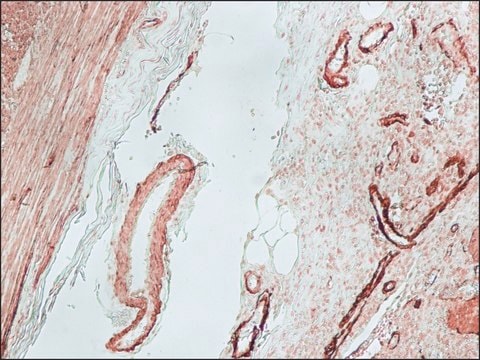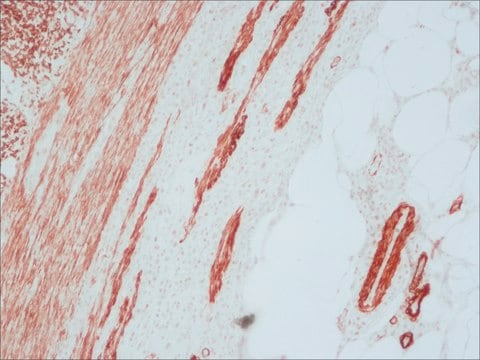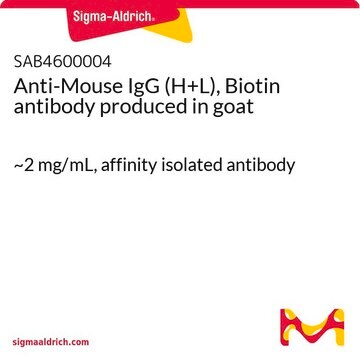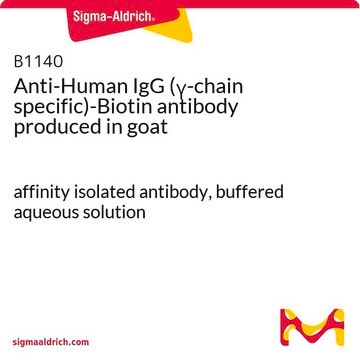B7022
Anti-Mouse IgG (γ-chain specific)−Biotin antibody produced in goat
affinity isolated antibody, buffered aqueous solution
Sign Into View Organizational & Contract Pricing
All Photos(1)
About This Item
Recommended Products
biological source
goat
Quality Level
conjugate
biotin conjugate
antibody form
affinity isolated antibody
antibody product type
secondary antibodies
clone
polyclonal
form
buffered aqueous solution
technique(s)
direct ELISA: 1:20,000
storage temp.
2-8°C
target post-translational modification
unmodified
General description
Immunoglobulin G (IgG) is a glycoprotein antibody that regulates immune responses such as phagocytosis and is also involved in the development of autoimmune diseases . Mouse IgGs have four distinct isotypes, namely, IgG1, IgG2a, IgG2b, and IgG3. IgG1 regulates complement fixation in mice . Goat Anti-Mouse IgG (γ-chain specific)-Biotin antibody specific for mouse IgG when tested against mouse IgA, IgG (all subclasses), and IgM.
Immunogen
Mouse IgG
Application
Anti-Mouse IgG (γ-chain specific)-Biotin antibody ELISA is suitable for use in ELISA (1:20,000) and direct immunomagnetic sorting (1:150 ).
Physical form
Solution in 0.01 M phosphate buffered saline pH 7.4, containing 1% bovine serum albumin and 15 mM sodium azide.
Disclaimer
Unless otherwise stated in our catalog or other company documentation accompanying the product(s), our products are intended for research use only and are not to be used for any other purpose, which includes but is not limited to, unauthorized commercial uses, in vitro diagnostic uses, ex vivo or in vivo therapeutic uses or any type of consumption or application to humans or animals.
Not finding the right product?
Try our Product Selector Tool.
Storage Class Code
10 - Combustible liquids
WGK
nwg
Flash Point(F)
Not applicable
Flash Point(C)
Not applicable
Certificates of Analysis (COA)
Search for Certificates of Analysis (COA) by entering the products Lot/Batch Number. Lot and Batch Numbers can be found on a product’s label following the words ‘Lot’ or ‘Batch’.
Already Own This Product?
Find documentation for the products that you have recently purchased in the Document Library.
Valeria Carolina Colombo et al.
Transboundary and emerging diseases (2021-07-06)
SARS-CoV-2 human-to-animal transmission can lead to the establishment of novel reservoirs and the evolution of new variants with the potential to start new outbreaks in humans. We tested Norway rats inhabiting the sewer system of Antwerp, Belgium, for the presence
Immunomagnetic separation of cells of the toxic dinoflagellate Alexandrium fundyense from natural plankton samples
Aguilera, A., et al.
Marine Ecology Progress Series, 143, 255-269 (1996)
Maria Victoria Sanchez et al.
PloS one, 9(8), e104824-e104824 (2014-08-21)
There is a critical need for new influenza vaccines able to protect against constantly emerging divergent virus strains. This will be sustained by the induction of vigorous cellular responses and humoral immunity capable of acting at the portal of entry
Jun P Hong et al.
Cell reports. Medicine, 1(3) (2020-07-24)
CD137 is a costimulatory receptor expressed on natural killer cells, T cells, and subsets of dendritic cells. An agonistic monoclonal antibody (mAb) against CD137 has been used to reduce tumor burden or reverse autoimmunity in animal models and clinical trials.
K M Lima et al.
Gene therapy, 10(8), 678-685 (2003-04-15)
The high incidence of tuberculosis around the world and the inability of BCG to protect certain populations clearly indicate that an improved vaccine against tuberculosis is needed. A single antigen, the mycobacterial heat shock protein hsp65, is sufficient to protect
Our team of scientists has experience in all areas of research including Life Science, Material Science, Chemical Synthesis, Chromatography, Analytical and many others.
Contact Technical Service








